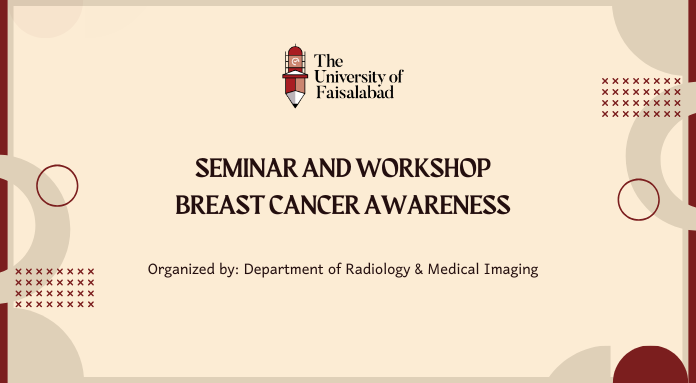Breast Cancer Awareness Seminar & Workshop: Fighting Stigma, Promoting Early Detection
Introduction
Breast cancer continues to be one of the most serious health challenges for women worldwide, and Pakistan is among the countries facing high incidence and late-stage diagnoses. Recognizing this, the University of Faisalabad (TUF) recently held a “Breast Cancer Awareness Seminar and Workshop” aimed at educating women—students, faculty, and staff—on prevention, early detection, and demystifying common misconceptions. The event played a pivotal role in raising awareness, empowering participants, and fostering community action against breast cancer.
Why Awareness & Early Detection Matter
- High prevalence, low awareness: Many cases in Pakistan are diagnosed at later stages, which significantly reduces the chances of successful treatment.
- Survival rates improve dramatically with early diagnosis: When breast cancer is detected early—before it spreads—treatment is often more effective and less invasive.
- Stigma & myths: Cultural taboos and misinformation prevent many women from seeking care or talking about symptoms. Awareness helps break these barriers.
Key Components of the Seminar & Workshop
Educational Sessions
Medical experts and oncologists spoke about:
- Basic breast anatomy and the biological basis of breast cancer.
- Risk factors such as family history, lifestyle factors (diet, exercise), environmental exposure, and hormonal influences.
- Signs and symptoms to watch for, including lumps, changes in breast shape, skin dimpling, nipple discharge, and more subtle signs.
Self-Examination & Clinical Screening
Practical demonstrations were provided to teach participants how to perform breast self-examination (BSE). Emphasis was placed on:
- Regular monthly self-checks.
- What to feel for during an examination.
- How to seek clinical examination and imaging when irregularities are found.
Also discussed were mammograms, ultrasound, and other diagnostics; when they are recommended, especially for older age groups or high-risk individuals.
Myth-Busting & Psychological Support
Speakers addressed common myths:
- Breast cancer only affects older women.
- That finding a lump always means cancer.
- That treatment always leads to disfigurement.
There was also a component dedicated to psychological well-being: coping with fear, seeking support, and understanding that early treatment can preserve quality of life.
Workshop Activities
The workshop component included:
- Interactive sessions where participants could ask questions in a safe, stigma-free environment.
- Visual aids and models to reinforce how to do self-screening properly.
- Possibly role-plays or skits by students to depict stories of early detection and recovery (if part of the program).
- Distribution of educational materials so participants can share knowledge with friends/family.
Outcomes & Impact
The seminar and workshop had several immediate benefits:
- Empowering participants: Many women gained confidence to perform self-exams and recognize early warning signs.
- Increased knowledge: Improved understanding of risk factors and screening methods.
- Community reach: Students and faculty serving as ambassadors, sharing this knowledge onward, magnifying impact.
- Breaking stigma: Open discussion helps reduce shame and hesitation, increasing chances that women will seek help when needed.
Longer-term benefits may include:
- Earlier detection in the population benefiting from such programs.
- Lower mortality and morbidity rates.
- Improved collaboration between health providers, educators, and community organizations.
Challenges Highlighted & What To Do Next
The event also brought up some challenges to address:
- Access to screening services for all: cost, availability, and geographic access.
- Cultural hesitance: some women may still feel discomfort or fear discussing breast health.
- Maintaining regular follow-ups: people often delay or ignore routine checks.
To build on the momentum, suggested actions include:
- Offering periodic screening camps or mobile units.
- Ongoing workshops/seminars in schools, colleges, and remote areas.
- Training peer educators so awareness spreads from within communities.
- Ensuring information is sensitive, accessible, and culturally appropriate.
Conclusion
The “Breast Cancer Awareness Seminar and Workshop” held at the University of Faisalabad marked a significant step towards improving public health outcomes. By combining education, demonstration, myth-breaking, and psychological support, the event provided women with the tools they need to protect themselves—and their communities.
Early detection saves lives. Awareness can dispel fear. Workshops like these are not just temporary events; they spark lasting change. The more we talk, educate, and act, the stronger our ability to reduce the burden of breast cancer in Pakistan.

